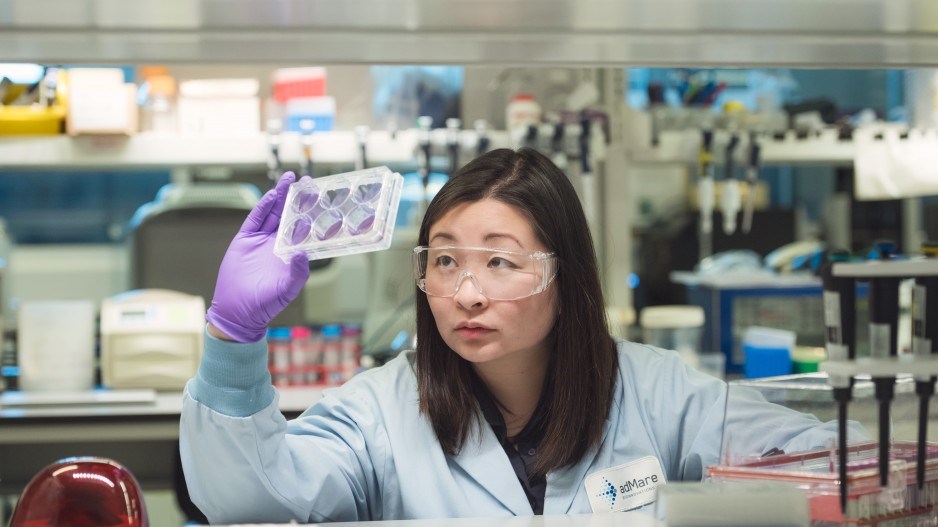In a time of unprecedented demand, Vancouver is experiencing a critical shortage of wet lab space.
Startup companies in the life sciences industry are reporting increased difficulty in accessing turnkey wet lab space, which allows them to develop their work through early studies. Without data, companies are unable to attract investors who provide research and development funding.
This means that early life sciences companies are having to put their research and development on hold, possibly for years, until new laboratory spaces get built.
“It’s a bit of a catch-22, because you need the data to be able to attract the investment to be able to build your own facilities. But, you need your own facilities to be able to generate the data,” said Lana Janes, co-founder and senior vice-president of operations and innovations at Abdera Therapeutics Inc., a Vancouver biopharmaceutical startup that specializes in the treatment of cancer with radioisotopes.
Janes described access to wet lab space as a “critical part of the life sciences ecosystem” and a necessary step for any company that is looking for financing and future growth opportunities.
The design elements of wet lab space allow companies to safely handle chemicals and contaminants. These elements include higher ceilings, stronger floor load capabilities, backup power generator capacity, efficient riser locations for ducting, an oversized loading dock and wider pathways.
“Health and science is not ever going to go out of fashion. It’s pretty bulletproof, but it takes that infrastructure piece. It’s not like a software company that can grow in a big backyard or a basement or in an office. It’s a specialized industry that needs infrastructure,” said Blair Quinn, a founding member of the CBRE High Technology Facilities Group.
B.C. is home to Canada’s largest biotechnology company, Stemcell Technologies, as well as at least four of Canadian biotech companies that each have a market capitalization in excess of $1 billion, according to the province’s Ministry of Jobs, Economic Development and Innovation.
For each of these industry-leading companies, such as Stemcell or AbCellera Biologics Inc. (Nasdaq:ABCL), there are another five large life sciences companies, and another 120 startups who cannot afford to compete for space, said Quinn.
When Abdera launched in 2021, the company was able to secure $8 million in seed financing and access to wet lab space through the life sciences accelerator adMare BioInnovations.
“For any small company starting out, it is a large barrier of entry to find your own space or build out your own space. Having that available for that period of time to help us go from a startup to scale up and drive the company was so critical to the mission,” Janes said.
Part of adMare’s mission is to provide space for startup companies through the adMare Innovation Centre, located on the University of British Columbia’s (UBC) Vancouver campus. However, increased industry demand means many companies might not be able to access the resources adMare provides.
“We are receiving calls weekly, asking for new space and constantly having to turn folks down. These are, in many cases, investigators coming out of the university. They have brilliant ideas, they’ve just filed patents, they want to spin out a startup company and they can’t find space,” said Christine Allen, vice-president of ecosystem development at adMare.
Without dedicated space, startup companies can outsource work to contract research companies, borrow space from more established life sciences companies, remain tied to educational institutions like UBC or retrofit an office or warehouse space.
Many of these options limit the flexibility of an early-stage company and can come with administrative burdens and costs that are “particularly expensive for a startup company,” Janes said.
In mid-April, the province launched its B.C. Life Sciences and Biomanufacturing Strategy, which includes a $10 million investment in a new wet lab facility to be led by adMare. The funding will support 20 startups through access to roughly 30,000 square feet of turnkey wet lab space, according to Allen.
Other partners will invest $13 million in adMare’s wet lab expansion, for a total $23 million investment, according to the Ministry of Jobs, Economic Development and Innovation. “[The funding] is allowing us to expand our footprint, essentially doubling it in Vancouver,” said Allen.
Instead of building a purpose-built space, adMare will lease lab and office space in a project under development in either the Broadway Corridor, Mount Pleasant or False Creek Flats areas. Allen said the company hopes to have occupancy by 2025.
Low Tide Properties is building Lab 29 in that area, at 1629 Scotia St. The building include 210,000 square feet designed to support wet lab use, said Adam Mitchell, vice-president of asset management and development at Low Tide.
The firm owns and operates four buildings in Vancouver that offer 300,000 square feet of wet lab space. According to Mitchell, 100 per cent of this space is currently leased. While pre-leasing is not in place for Lab 29, Low Tide is speaking with interested groups, he said.
“Often, when a life science company needs the space, they needed it yesterday, as opposed to three years down the road. They get caught between not having surety of funding based on research and development results, and the urgency of needing the space if they are successful,” said Mitchell.



